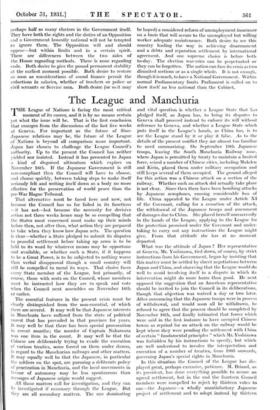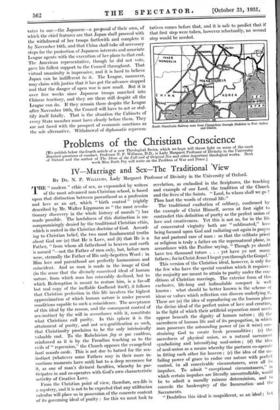The League and Manchuria
THE League of Nations is facing the most critical moment of its career, and it is by no means certain yet what the issue will be. That is the first conclusion that emerges from the discussions of the last five weeks at Geneva. For important as the future of Sino- Japanese relations may be, the future of the League of Nations is beyond all comparison more important. Japan has chosen to challenge the League Council's authority. Up to the present the Council has neither yielded nor insisted. Instead it has presented to Japan a kind of disguised ultimatum which expires on November 16th. If the Japanese Government is still non-compliant then the Council will have to choose, and choose • quickly, between taking steps to make itself seriously felt and writing itself down as a body no more effective for the preservation of world peace than the pre-War Hague Tribunal.
That alternative must be faced here and now, not because the Council has so far failed in its functions —it has not—but because the necessity for decisive action not three weeks hence may be so compelling that the States most concerned must make up their minds before then, not after then, what action they are prepared to take when they know how Japan acts. The question is clear—whether a State pledged to submit its disputes to peaceful settlement before taking up arms is to be held to its word by whatever means may be opportune and available, or whether such a State, if it happens to be a Great Power, is to be subjected to nothing worse than verbal disapproval though a small country will still be compelled to mend its ways. That choice faces every State member of the League, but primarily, of course, those with seats on the Council, whose members must be instructed how they are to speak and vote when the Council next assembles on November 16th or earlier.
The essential features in the present crisis must be clearly distinguished from the non-essential, of which there are several. It may well be that Japanese interests in Manchuria have suffered from the state of political unrest that has prevailed in that province for years. It may well be that there has been special provocation in recent months; the murder of Captain Nakamura was one item in the count. It may well be that the Chinese are deliberately trying to evade the execution of various treaties, some forced on them under duress, in regard to the Manchurian railways and other matters. It may equally well be that the Japanese, in particular the soldiers on the spot, are pursuing a deliberate policy of penetration in Manchuria, and the local movements in favour of autonomy may be less spontaneous than messages of Japanese origin would suggest.
All those matters call for investigation, and they can be investigated if necessary through the League. But they are all secondary matters. The one dominating and vital question is whether a League State that has pledged itself, as Japan has, to bring its disputes to Geneva shall proceed instead to enforce its will without reference to Geneva, and whether a League State which puts itself in the League's hands, as China has, is to see the League stand by it or play it false. As to the details of the present conflict they are almost too familiar to need summarizing. On September 19th Japanese troops, leaving the South Manchuria Railway zone, where Japan is permitted by treaty to maintain a limited force, seized a number of Chinese cities, including Mukden and Kirin, placed them under military occupation and still keeps several of them occupied. The ground alleged for this action was a Chinese attack on a section of the railway. Whether such an attack did actually take place is not clear. Since then there have been bombing attacks by Japanese aeroplanes, causing considerable loss of life. China appealed to the League under Article XI of the Covenant, calling for a cessation of the attack, the withdrawal of the Japanese troops and assessment of damages due to China. She placed herself unreservedly in the hands of the League, applying to the League for the protection promised under the Covenant and under- taking to carry out any instructions the League might give. From that attitude she has at no moment departed.
What was the attitude of Japan ? Her representative at Geneva, Mr. Yoshizawa, tied down, of course, by strict instructions from his Government, began by insisting that this matter must be settled by direct negotiations between Japan and China, and observing that the League would do well to avoid involving itself in a dispute in which its intervention might do more harm than good. He next opposed the suggestion that an American representative should be invited to join the Council in its deliberations, though that objection was waived a day or two later. After announcing that the Japanese troops were in process of withdrawal, and would soon all be withdrawn, he refused to agree that the process should be completed by November 16th, and finally intimated that forces which were said in the first instance to have occupied Chinese towns as reprisal for an attack on the railway would be kept where they were pending the settlement with China of certain " fundamental principles " which Mr. Yoshizawa was forbidden by his instructions to specify, but which are well understood to involve the interpretation and execution of a number of treaties, from 1905 onwards, governing Japan's special rights in Manchuria.
In this situation the Council of the League has dis- played great, perhaps excessive, patience. M. Briand, as its president, has done everything possible to secure an agreed settlement, but in the end the fourteen Council members were compelled to reject by thirteen votes to one—the Japanese—a wholly unsatisfactory Japanese project of settlement and to adopt instead by thirteen votes to one—the Japanese—a proposal of their own, of which the chief features are that Japan shall proceed with the withdrawal of her troops forthwith and complete it by November 16th, and that China shall take all necessary steps for the protection of Japanese interests and associate League agents with the execution of her plans to that end. The American representative, though he did not vote, gave his fullest support to the Council throughout. That virtual unanimity is impressive, and it is hard to believe Japan can be indifferent to it. The League, moreover, may claim with justice that it has got the advance stopped and that the danger of open war is now small. But it is over five weeks since Japanese troops marched into Chinese territory, and they are there still despite all the League can do. If they remain there despite the League after November 16th, the Council will have to act or stul- tify itself fatally. That is the situation the Cabinets of every State member must have clearly before them. They are not faced with the prospect of economic sanctions as the sole alternative. Withdrawal of diplomatic represen- tatives comes before that, and it is safe to predict that if that first step were taken, however reluctantly, no second step would be needed.
South Manchuria Railway runs from Changchun through Mukden to Port Arthur and Dairen.







































 Previous page
Previous page